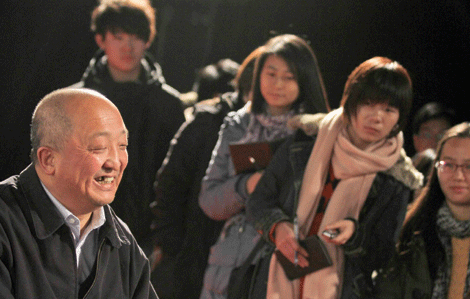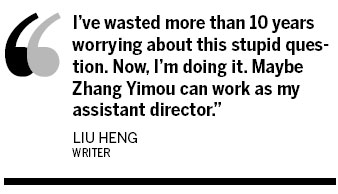Ghost scriptwriter
Updated: 2012-01-11 10:58
By Liu Wei (China Daily)
|
|||||||||||
|
 |
|
Having emerged from behind the scenes, writer Liu Heng intends to direct a film. [Jiang Dong / China Daily] |
Liu Heng, who has written many blockbuster scripts to virtually no acclaim, is ready to step out of the darkness and into the limelight. Liu Wei reports.
Writer Liu Heng has long been used to having his works, such as the screenplays of Zhang Yimou's Judou and The Story of Qiuju, and Feng Xiaogang's Assembly - gain acclaim while he remains essentially unknown. But he has emerged from behind the scenes, as his latest project with Zhang, The Flowers of War, has become the talk of the town.
Zhang sets his film against the backdrop of the Nanjing Massacre that killed about 300,000 Chinese in 1937. Several courtesans, who hide in a church's cellar, save 12 students from rape by Japanese troops.
As with most of Zhang's films, Flowers has stirred up controversy. Some harshly criticize the director for selling a nation's scar to the box office. Others praise it as his best work in recent years.
Great acclaim, however, has been lavished on Liu's script for its convincing lines and sophisticated structure.
The 57-year-old writer recalls he completed the first draft, adapted from woman writer Yan Geling's original story, on a mountain in northern Beijing.
He calls it a "failure", however, because he couldn't convince himself the story could have actually happened.
He asked Zhang's personal assistant to list all the churches around Nanjing.
Then, they traveled along the Yangtze River and visited all of them. He grabbed every clerk he met at the churches and asked detailed questions, such as whether the churches have cellars, how many people could hide in them and how the churches suffered during the war.
He continued writing in a 30-story building in Beijing but was interrupted one day in 2008, when the apartment started shaking. The trembling was caused by the Sichuan earthquake, which left about 90,000 dead or missing.
The disaster's tragic aftermath inspired him to understand his characters.
"Watching news about those buried under the ruins, I suddenly understood those who hid in the church's cellar," he says.
"The catastrophe brought down the wall between the characters and me."
Flowers is Liu's third cooperation with Zhang, who was also director of the 2008 Beijing Olympics' opening ceremony. The two have developed an understanding of each other, Liu says.
Zhang didn't come to Liu for the surrealistic Hero, the slapstick A Simple Noodle Story, or the romance flick Under the Hawthorn Tree.
He knows Liu is best at realistic subjects.
Before Liu wrote his first script in 1988, he had built his name as a novelist with Dogshit Food, a short story about a farmer's wife, who is obsessed with grain.
For years, he has depicted the bright and dark sides of ordinary Chinese people - farmers, oilfield workers, soldiers and the residents in Beijing's traditional alleys.
"Zhang knows exactly who is the best person for each of his scripts," Liu says.
Liu believes Zhang has established his unique visual style through outstanding talent.
"His works boast the beauty of exaggeration, which thrills as many as it disturbs," he says.
"He started as a cinematographer, and his techniques, especially his instinct for exaggeration, are impressive. You may like his style or not, but he has extraordinary willpower and spares no effort to achieve every goal."
Liu says he couldn't help but shed tears when he watched Flowers in the theater.
"If I have luckily walked a tightrope to complete the screenplay, Zhang has managed to walk dozens of them to finish the film," he says.
"The efforts of a crew of 600 people amplify the beauty of my work and conceal its flaws."
While most audiences don't notice who writes the script, they tend to remember the director's name. This is a fact scriptwriters must accept, Liu says.
"In filmmaking, the director is a fixed star," he says.
"Others are planets or even shooting stars. I feel good however dimly the spotlight is shed on me."
He recalls that nobody recognized him when he sat among the journalists at a seminar about Black Snow, a film he wrote that won the Silver Bear at the Berlin International Film Festival in 1990.
"I didn't feel uncomfortable," he says.
"Films are scripts' gravestones. A story dies when it has been adapted to the big screen. Nobody will care about the script, except for scholars who study screenplays."
That's why Liu loves theater.
In 2009, he wrote Wotou Compound, a play for the Beijing People's Art Theater that became an instant classic. It depicts ordinary Beijingers' joys and sorrows in a typical community before the city's 1949 liberation.
In 2008, he worked with two other famous scriptwriters - Zou Jingzhi and Wan Fang - to build a troupe that has produced five plays.
"A play is reborn every time it's staged by a new cast and crew," Liu says.
"Every performance adds value."
The writer also hopes to direct a film. He has signed on with the Beijing-based production company Galloping Horse.
Being a director has been his dream since he was 40, but he had been too anxious to go for it.
"What if the film is lame?" he says.
"I've wasted more than 10 years worrying about this stupid question. Now, I'm doing it. Maybe Zhang Yimou can work as my assistant director."
Today's Top News
Rescuers race against time for quake victims
Telecom workers restore links
Coal mine blast kills 18 in Jilin
Intl scholarship puts China on the map
More bird flu patients discharged
Gold loses sheen, but still a safe bet
US 'turns blind eye to human rights'
Telecom workers restore links
Hot Topics
Lunar probe , China growth forecasts, Emission rules get tougher, China seen through 'colored lens', International board,
Editor's Picks

|

|

|

|

|

|





